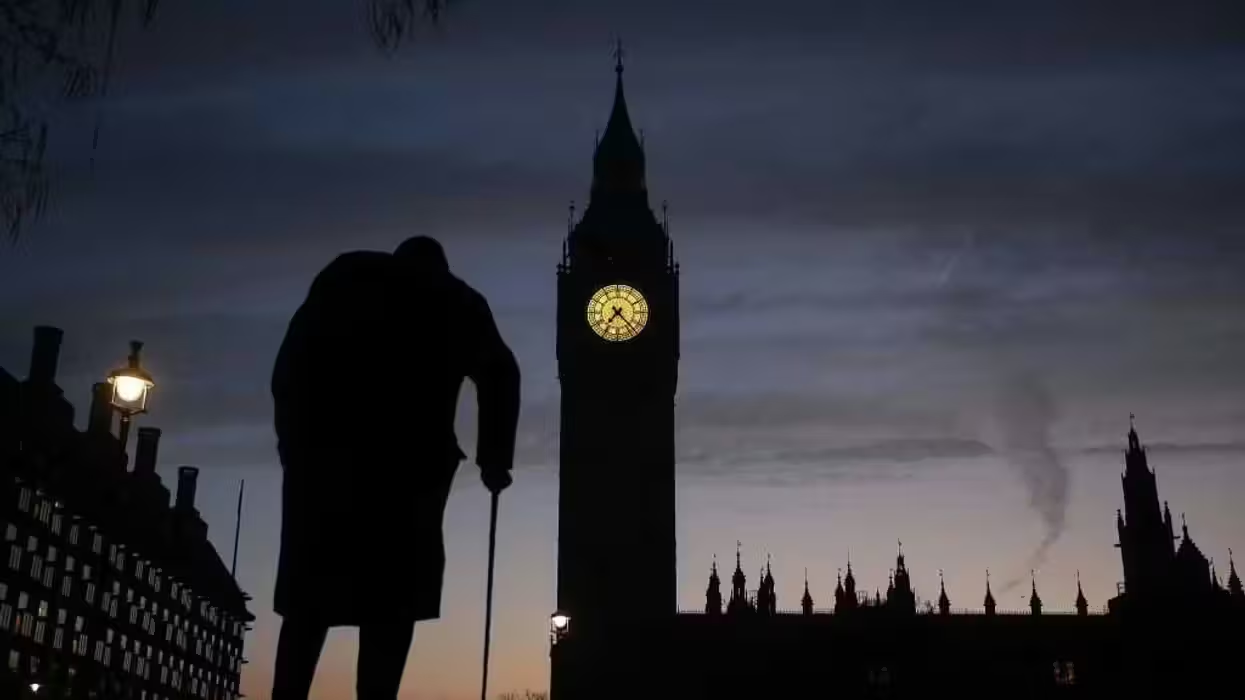
© 2025 Blaze Media LLC. All rights reserved.
Watch What Happens When Our Cameras Caught a 'Scramble' Order From NORAD While Interviewing the Pilots Who Protect Our Skies
September 05, 2014
"If those guys were to attempt another attack on the capital, that would be a dumb thing to do."
If Internet reports this week are true, Libyan terrorists may have control of 11 commercial airliners after an attack on the Tripoli airport.
While speculation from quoted U.S. officials indicates the threats of an attack are focused on the North African region, some Americans have expressed concern that the planes could be used in another attack on American soil.
But that idea would fail miserably, Lt. Col. Johnny Vargas, a 19-year Air Force veteran and combat-tested pilot, told TheBlaze.
 A picture taken on Aug. 26, 2014 shows a bullet casing and damaged airplanes on the tarmac at Tripoli International Airport in the Libyan capital after fighters from the Libyan Dawn coalition captured the airport from Zintan force, allies of rogue general Khalifa Haftar. (MAHMUD TURKIA/AFP/Getty Images)
A picture taken on Aug. 26, 2014 shows a bullet casing and damaged airplanes on the tarmac at Tripoli International Airport in the Libyan capital after fighters from the Libyan Dawn coalition captured the airport from Zintan force, allies of rogue general Khalifa Haftar. (MAHMUD TURKIA/AFP/Getty Images)
"If those guys were to attempt another attack on the capital, that would be a dumb thing to do," said the commander of the 113th Wing Aerospace Control Alert Squadron, the unit charged with protecting the skies over the Washington, D.C., region.
"If our adversaries were to try and steal an airliner for an attack, it makes no difference, they are going to be a blip on the radar, our controllers at [the Eastern Air Defense Sector] are going to find it ... and we are going to get airborne and intercept them," Vargas said.
Concerns grew wider after reports began to circulate Tuesday that 11 planes could have fallen into militants' hands after fighters seized and set fire to Tripoli International Airport last month, based on reported statements from U.S. officials.
"Islamist militias in Libya took control of nearly a dozen commercial jetliners last month, and western intelligence agencies recently issued a warning that the jets could be used in terrorist attacks across North Africa," the Washington Free Beacon initially reported. As the report spread, fears mounted that the planes could be used in a 9/11-style attack either on American soil or in other European states. According to the Daily Mail:
"A total of 11 commercial jets from state-owned carriers Libyan Airlines and Afriqiyah Airways went missing in August after militants from the so-called 'masked men brigade' overran the airport. U.S. officials fear that these aeroplanes could now be used to carry out 9/11-style attacks in the region on the anniversary of the tragedy this month."
Concern spread on social media as well.
The news of the potentially stolen planes just reaffirms why the 113th Wing has been on 24/7-alert response status — capable of taking off with weapons loaded to respond to a potential threat within a moment's notice — each day since 9/11, Vargas told TheBlaze. And they take that heritage seriously: pilots from the 113th Wing were the first aerial responders to react to the threat over Washington, D.C., on Sept. 11. They circled the Pentagon as flames from that crash rose into the sky and were given the order to take down United Airlines Flight 93 if it approached the Capitol.
Several other units across the country have since stood up as part of the Aerospace Control Alert force, coordinated by NORAD, to defend the homeland against aerial threats.
"Before 9/11 we weren't necessarily postured for a non-symmetric attack," Lt. Gen. William Etter, commander of the Continental U.S. North American Aerospace Defense Command Region, told TheBlaze. "Our mission is to dissuade, detect, deter -- and if necessary -- destroy a threat. We certainly don't want to do that, but if someone threatens us, we will."
Vargas said he and the other pilots were trained and ready to use deadly force, meaning they would be authorized and willing to either shoot down or even ram a plane that threatened the White House, the Capitol or the Pentagon, among other key assets.
"Now that order would come from an appropriate level," Etter said, but would not confirm with TheBlaze exactly who that meant.
"The use of deadly force is a huge obligation," Vargas said, "but it's something we train to on a daily basis for other missions, for when we go overseas and for other contingency operations around the world. But ... we train to employ weapons with great precision, but it would be the last course of action."
Etter confirmed he had heard of the reports that 11 airliners could be under terrorist control, but said that didn't change the way his command would prepare for a potential attack.
"Our job is the plan for the worst ... in the military we plan for the most dangerous and the most likely (threats)," Etter said, "and I believe we are postured to respond to any of those scenarios."
Just days after news of the planes falling into the wrong hands, some sources speculated whether or not any planes were "missing" from the airport, as initially reported. But images from the airport battle indicate that at the very least the planes could be under jihadist control. Pictures of Libyan terrorists posing with some of the airplanes taken from the Tripoli can be seen online, and soldiers from the group Libyan Dawn can be seen climbing on to the wings of commercial jets while smiling and waving for the camera, according to the Daily Mail.
TheBlaze was given exclusive access to the 113th Wing Aerospace Control Alert facility Wednesday, and while the cameras were rolling, a real-world alert came across the wire and the pilots and maintainers jumped to respond. Check it out:
--
Follow Elizabeth Kreft (@elizabethakreft) on Twitter.
Want to leave a tip?
We answer to you. Help keep our content free of advertisers and big tech censorship by leaving a tip today.
Want to join the conversation?
Already a subscriber?
more stories
Sign up for the Blaze newsletter
By signing up, you agree to our Privacy Policy and Terms of Use, and agree to receive content that may sometimes include advertisements. You may opt out at any time.
Related Content
© 2025 Blaze Media LLC. All rights reserved.
Get the stories that matter most delivered directly to your inbox.
By signing up, you agree to our Privacy Policy and Terms of Use, and agree to receive content that may sometimes include advertisements. You may opt out at any time.





